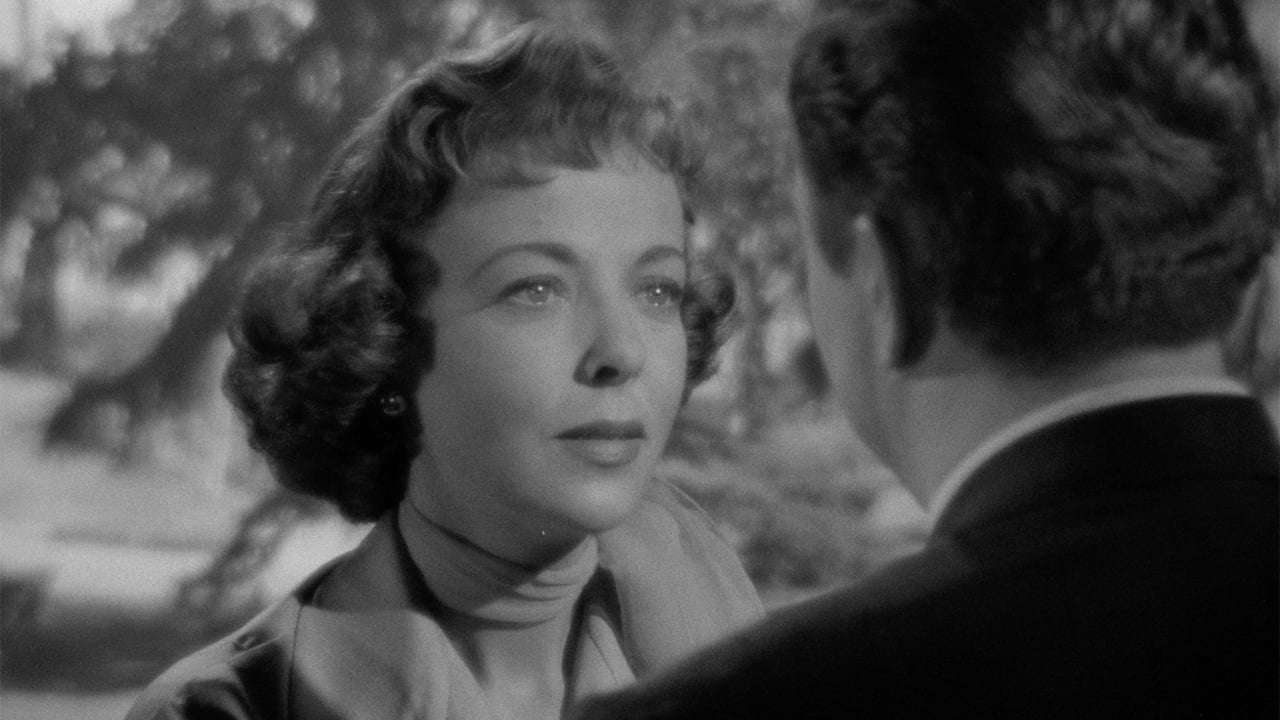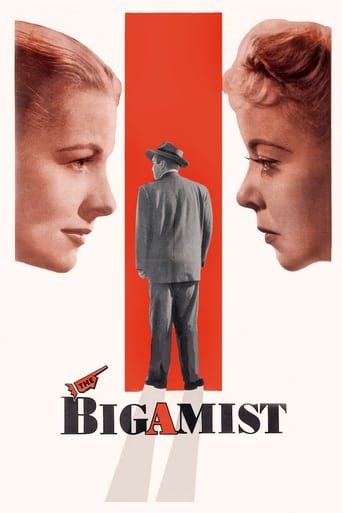



If you like to be scared, if you like to laugh, and if you like to learn a thing or two at the movies, this absolutely cannot be missed.
View MoreI think this is a new genre that they're all sort of working their way through it and haven't got all the kinks worked out yet but it's a genre that works for me.
View MoreOne of the worst ways to make a cult movie is to set out to make a cult movie.
View MoreThrough painfully honest and emotional moments, the movie becomes irresistibly relatable
View MoreI have to give director Ida Lupino quite bit of credit for the way in which she handled what some directors might have made very sensationalistic. Instead, she directs this with restraint, seemingly saying that normal people do things that are not necessarily accepted...it just happens.The cast does a fine job here. Edmond O'Brien comes across as a sort of "every man", as the traveling salesman who has 2 wives. Joan Fontaine is wife #1, and she and O'Brien are trying to adopt a child. Along comes Edmund Gwenn, as the head of the adoption agency, who has a hunch something is wrong, and discovers the bigamy. Gwenn had the ability to play both heavies and beloved figures...here, it's sort of in-between as he refuses to make another mistake in assigning a child; he's very good here, as he discovers wife #2 -- Ida Lupino, who seems very real and likable, despite the situation. The wonderful Jane Darwell has a minor part as a custodian. Interstingly, Lillian Fontaine -- mother of Joan Fontaine and Olivia DeHavilland -- has a small part as the owner of a boarding house.Ida Lupino, who directed, certainly did have a subtle sense of humor. Early on in the film, Joan Fontaine referred to Edmund Gwenn's character as seeming like Santa Claus (and as you may remember, he indeed did play Santa Claus in "Miracle On 34th Street" six years earlier. And during the bus tour, they show the houses of (among others) Jack Benny, Jimmy Stewart...and Edmund Gwenn! A negative about this film probably has to do with...well, the negative. This film was produced by the production company that Ida Lupino and her husband (Collier Young) formed. Their budgets were thin, but the topics dealt with popular social issues. Lupino herself directed all 6 films made by The Filmmakers company. The films were distributed by RKO. The company folded after this film. The print used on TCM for this (and several of the other The Filmmakers films) is not in particularly good condition. I imagine that is because the negatives/prints were not kept to the higher standards of the large studios. It's not uncomfortable to watch, but in some spots the quality of the negative is a little distracting.I wasn't totally pleased with the ending of the film. What happens to each of them...particularly the women...and children. And who does he come back to after prison? If anyone. Too many loose ends to be totally satisfying, but nevertheless, a well done film.
View MoreThe Bigamist is directed by Ida Lupino and adapted to screenplay by Collier Young from a story by Larry Marcus and Lou Schor. It stars Lupino herself with Edmund O'Brien, Joan Fontaine, Edmund Gwenn and Kenneth Tobey. Music is scored by Leith Stevens and cinematography by George Diskant.Harry Graham (O'Brien) tells adoption agency inspector Mr. Jordan (Gwenn) how he came to have two wives. One in Los Angeles (Lupino), the other in San Francisco (Fontaine).Initially released as part a double bill with Lupino's The Hitch-Hiker, The Bigamist is the lesser known film and the lesser thought of picture at that. Where The Hitch-Hiker is a more aggressive and claustrophobic noir picture, The Bigamist is more a Sirkian melodrama with noir touches. What transpires in the gifted hands of noir darling Lupino is a film examining a complex male protagonist, a guy suffering desperately from loneliness and alienation, his only moments of happiness comes in the arms of two women. If this sounds like Lupino is taking a sympathetic approach to Harry Graham? Then yes that is true, but he is portrayed as being morally ambiguous and weak, with the deft insertion of fate's deadly hand into the story as Harry tries on occasions to do the legal and right thing."I can't figure out my feelings towards you, I despise you, and I pity you. I don't even want to shake your hand, and yet I almost wish you luck." Once the story reaches the pinnacle, female parties are left dislocated, hurt and confused about their emotions, Harry is crushed, and we believe his pain because he is not a selfish bastard. Some of the most telling passages of dialogue come from other men, Gwenn's agency inspector and the Judge (John Maxwell) presiding over the court case, these helping to not stereotype the Graham character. The finale also refuses to take an easy way out, it's left deliberately ambiguous, the final shot open ended. Shot at real L.A. and Frisco locations, film has some nice visual touches. Harry in shadowy hotel rooms, his lonely walks down town, while venetian blinds feature and a shadowed bathed staircase banister showcases the talents of Diskant (On Dangerous Ground/The Narrow Margin/Kansas City Confidential). It's not an overtly film noir picture visually, but there are snatches in the mix. Cast are bang on form, with O'Brien particularly impressive when portraying conflicted emotions.It's not perfect, strong characters the lead trio may be, but they are all so nice, there's no edge there. There's an inside joke that comes off as flat and misplaced, while Stevens' score is often intrusive in desperately trying to set up emotional impact. But these are small complaints that don't stop the picture's great strengths from storming through to hold the attention. It's an interesting picture, a cautionary tale choosing to analyse rather than point the finger. It deserves to be more well known these days and certainly shouldn't be viewed as an apology for Bigamy. 7.5/10
View MoreTraveling Salesman Edmund O'Brien is in a spot. He has been caught as a bigamist and tells how he got into this predicament. In San Francisco, he's already married to a sweet lady (Joan Fontaine) who is like every perfect TV wife. Then, while on business in Los Angeles, he goes on a tour of the stars homes and meets Ida Lupino who happens to be on the tour just because she likes to rest on buses. After seeing the homes of James Stewart, Jack Benny, Barbara Stanwyck, Jane Wyman and Edmund Gwenn (who plays the character O'Brien happens to be telling his story to), they go to the Chinese restaurant where Lupino works. One thing after another happens, and O'Brien finds himself proposing to the ailing Lupino. Once everything is exposed, O'Brien ends up in court where the two wives see each other for the very first time.This is more of a character study than the plot of a movie. It feels like it could be more appropriate for a TV anthology series at under an hour. Lupino is an expert director and actress, and like Fontaine's role, her character is extremely likable. It's understandable why O'Brien would be drawn to both of them. Yet, why the man doesn't find a profession to keep him near his first wife (Fontaine) to prevent his loneliness is never addressed. I longed for an actual speaking scene between Lupino and Fontaine who at different times in their lives (Lupino-prior, Fontaine-current) were married to the same man (Collier Young, who happened to write the screenplay). The film takes a long time to grab any interest, and by that time, it's more because you feel sorry for these characters rather than the pace of the movie.I was rather disappointed in the ending which I felt was a letdown. It gives the impression that the writer wanted to let the audience choose whom O'Brien ended back up with. Still, there's a glorious silent smile between Fontaine and Lupino that says more than a hundred words could.
View MoreConsidering its resources and it's rather small budget, this is a pretty good movie, from director/actress Ida Lupino. It was made without the backing of any big studios but yet it starred some capable and big name actors in it, no doubt thanks to Lupino's connections in Hollywood. Ida Lupino was quite a big name actress at the time, thanks to roles she played in "High Sierra", "They Drive by Night" and "The Sea Wolf", among others. But due to her age good acting roles were becoming more hard and hard to get by. She then decided to do a not so common thing for a female at the time; she decided to direct and also write movies on her own. Not that she ever became much successful with it though but that seems hardly her fault. There were simply no big studios or producers at the time who dared to back a female director up at time, despite of her good reputation as an established actress. Therefor she got mostly stuck to directing low budget films that never got big releases. This is a real shame, since she definitely had some directing qualities and knew how to bring a good story to the screen.Perhaps with this movie Lupino also tried to make a social statement and address the issue of bigamy, which supposedly was happening on quite a large scale at the time but was of course not much talked about. So seems to me that this movie was handling a quite delicate matter, though the movie doesn't ever try to make a big issue out of it, or try to be preachy about it. You don't really know whether you should hate or care for this man and the situation that he got into, as the Edmund Gwenn character also says in the movie. You don't like him at first or what he is doing but yet you can also grow some understanding for him and hope things will work out for the good of him in the long run.It's pretty obvious that this movie was low budget, especially when you compare it to the other stuff that got done in 1953. It has a simplistic and cheap look over it but the movie sort of overcomes this all, thanks to its good story and the overall handling of it, by the director and actor.This movie has quite some big names in it, next to Ida Lupino herself of course. Edmond O'Brien plays the real main and not so grateful role of the movie. He does handle his character and manages to be unlikeable in the beginning but likely toward the end. Joan Fontaine also stars, as does her mother Lillian Fontaine, in a much smaller role. Definitely a good movie, also especially when consider its limited resources and the fact that a female directed it, in a time when this wasn't really socially accepted in Hollywood.7/10http://bobafett1138.blogspot.com/
View More